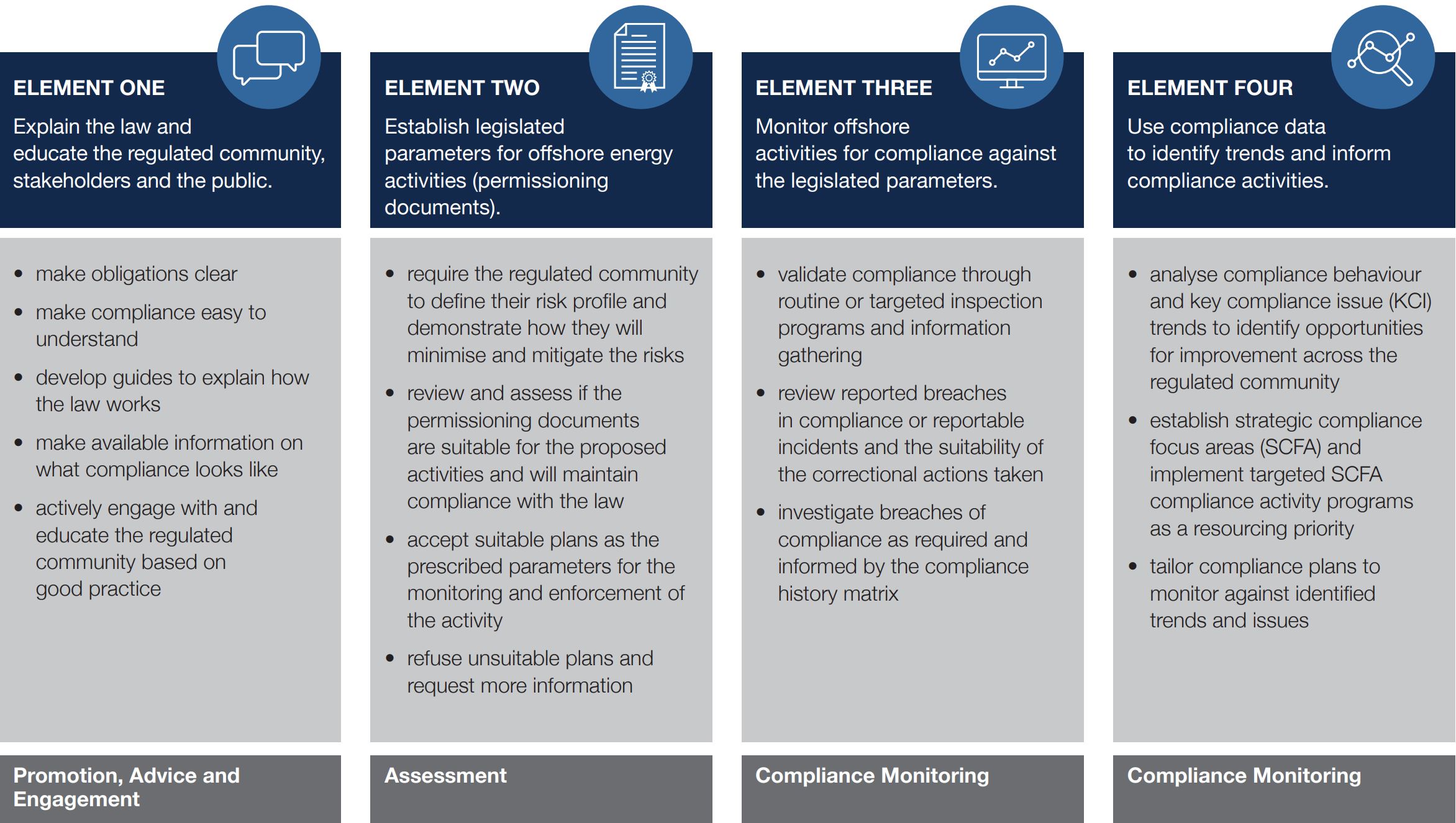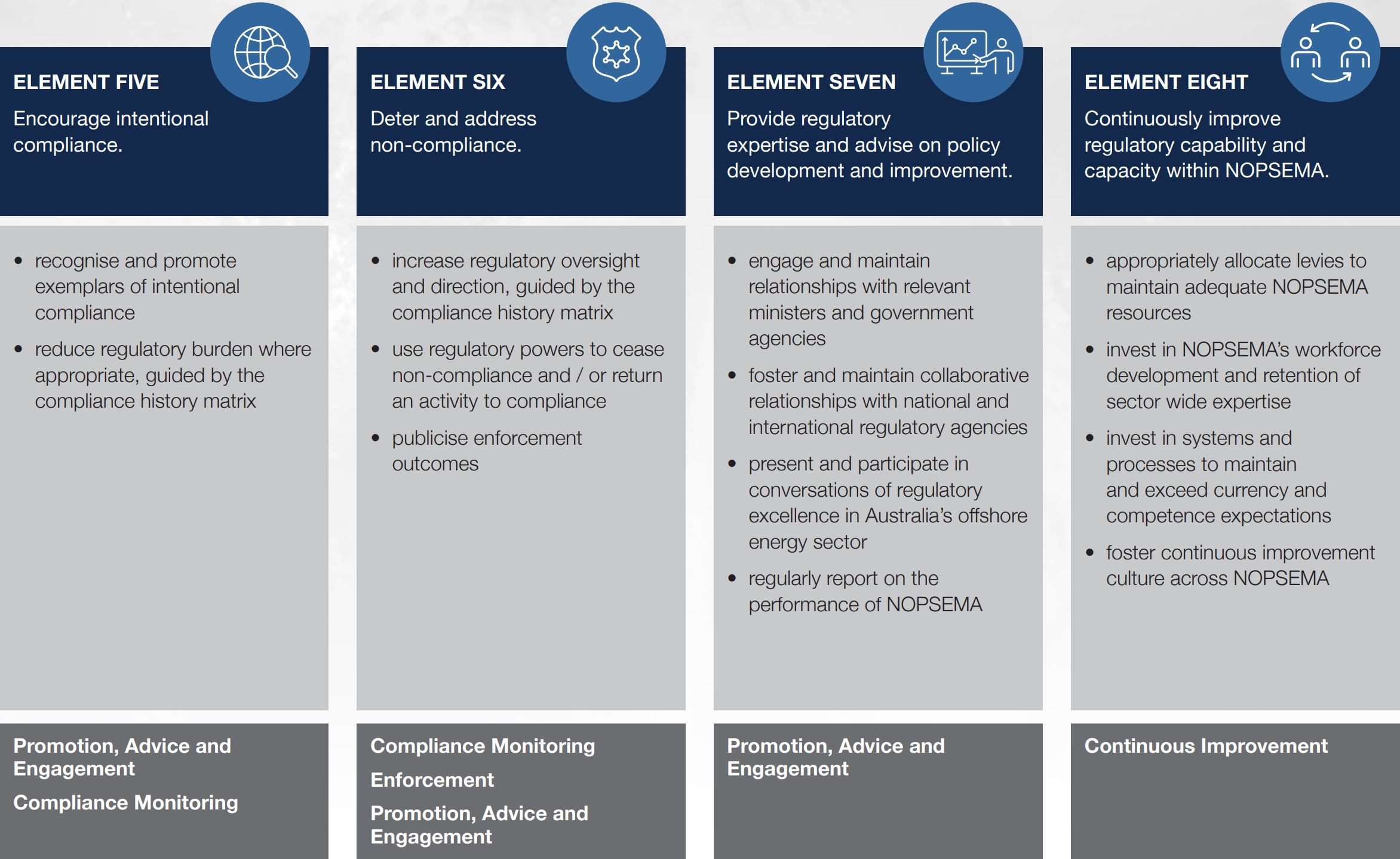Compliance Strategy
NOPSEMA’s Compliance Strategy serves to inform offshore energy stakeholders on how we intend to foster intentional compliance and deter non-compliance in Commonwealth waters.
We will actively engage and educate the regulated community to encourage and support voluntary compliance and will ensure our response to any non-compliance is proportionate to the risks posed and behaviour of the industry, including their compliance history.
Through implementing the Compliance Strategy 2023, NOPSEMA will support a safe and environmentally responsible offshore energy industry and maintain community and Government trust in its regulation.
 NOPSEMA’s Compliance Strategy 2023 has been published to inform stakeholders of how we intend to foster a culture of voluntary compliance and how we will treat and deter non-compliance across the offshore energy industry in Commonwealth waters.
NOPSEMA’s Compliance Strategy 2023 has been published to inform stakeholders of how we intend to foster a culture of voluntary compliance and how we will treat and deter non-compliance across the offshore energy industry in Commonwealth waters.
In its most straight-forward sense, compliance is about the ability of the offshore energy industry to continually reduce the risks and impacts of their activities to a level that is as low as reasonably practicable (ALARP) and acceptable.
There are eight elements underpinning NOPSEMA’s compliance strategy outlining how our regulatory activities will drive continuous improvement in the offshore energy industry to a point of consistent and intentional compliance.
I believe most of the NOPSEMA regulated community do the right thing to achieve the right safety and environment outcomes and comply with their legislative obligations.
NOPSEMA will actively engage and educate the community to simplify the law and provide tools and information to encourage and support voluntary compliance. For those that demonstrate compliance, their efforts will be recognised and where possible, shared with the industry as an exemplar of performance.
In regard to NOPSEMA’s regulatory response to any non-compliance, we will ensure our response is proportionate to the risks posed and the behaviour of the duty holder, including their compliance history. The compliance history matrix in this strategy provides an overview of the tools and indicative approaches available to NOPSEMA to allow us to scale our response to varying levels of non-compliance.
The expectation of continuous improvement also applies to the performance of NOPSEMA. We will continue to ensure regulatory levies are allocated appropriately to maintain adequate NOPSEMA resources, invest in the development and retention of our own expertise, as well as our systems and processes.
We continue to engage with relevant ministers and government agencies to ensure the regulatory settings are fit-for-purpose and meeting the policy objectives of the Government and foster and maintain collaborative relationships with national and international regulatory agencies.
In implementing this strategy, NOPSEMA will be able to support a safe and environmentally responsible offshore energy industry and maintain community and Government trust in its regulation. I encourage the regulated community to read this compliance strategy and engage with NOPSEMA if you require any further information or advice.
NOPSEMA – the National Offshore Petroleum Safety and Environmental Management Authority – is Australia’s independent, expert regulator for the offshore energy industry. NOPSEMA oversees workforce health and safety, structural and well integrity, and environmental management for all offshore energy operations and greenhouse gas storage activities in Commonwealth waters (and in coastal waters where regulatory powers and functions have been conferred). NOPSEMA’s regulated community is broad and includes all parties involved in the exploration and recovery of petroleum and greenhouse gas activities.
Established under the Offshore Petroleum and Greenhouse Gas Storage Act 2006 (OPGGS Act), NOPSEMA is a statutory authority who operates in accordance with or regulates under Australian Government legislation and regulations including:
- Offshore Electricity Infrastructure Act 2021
- Offshore Petroleum and Greenhouse Gas Storage (Regulatory Levies) Act 2003
- Offshore Petroleum and Greenhouse Gas Storage Act 2006
- Public Governance, Performance and Accountability Act 2013
- Environment Protection and Biodiversity Conservation Act 1999
- Offshore Petroleum and Greenhouse Gas Storage (Resource Management and Administration) Regulations 2011
- Offshore Petroleum and Greenhouse Gas (Environment) Regulations 2023
- Offshore Petroleum and Greenhouse Gas (Safety) Regulations 2024
- Offshore Petroleum and Greenhouse Gas (Regulatory Levies) Regulations 2022
NOPSEMA’s functions are prescribed in the OPGGS Act under s646 with our legislated remit broadly consisting of four functional areas underpinned by continuous improvement:
- promotion, advice and engagement
- assessment
- compliance monitoring (including inspection and investigation)
- enforcement
Some of the activities under our legislated remit may include, but are not limited to:
- Advising and promoting on matters relating to occupational health and safety (OHS), structural and well integrity, and environmental management.
- Developing and implementing effective monitoring and enforcement strategies to ensure compliance.
- Investigating accidents, occurrences and circumstances relating to OHS, structural and well integrity, and environmental management.
- Making reports, including recommendations, to the responsible Commonwealth minister and each responsible state and Northern Territory minister.
- Cooperating with other Commonwealth and state or Northern Territory agencies or authorities which have functions relating to regulated operations.
NOPSEMA administers an objectives-based, risk focused, regulatory regime. In practice, this places the responsibility for identifying, mitigating and minimising risk with those wishing to undertake the offshore energy activities – the ones who are creating the risks. This means that while NOPSEMA does not prescribe how risks must be managed, we regulate to ensure a consistently high threshold must be met.
When proposing their activities, the regulated community is responsible for defining what their risks are and demonstrate how they will mitigate and minimise their impact to achieve compliance with the regulatory regime. Once these proposals, collectively referred to as permissioning documents, are assessed and accepted by NOPSEMA, they form the legislated parameters for that activity which will be monitored and enforced to ensure compliance.
A risk focused and objective-based regulatory regime:
- Is adaptable, flexible and scalable to the particular circumstances of individual activities, as well as the environments in which they take place.
- Provides the opportunity to adopt advances in technology and apply control measures that are best suited to the individual circumstances of the activity.
- Encourages the adoption of best practice management systems and continuous improvement in all aspects of performance.
- Is recognised internationally by regulatory authorities, risk management professionals and academics as being the most appropriate regulatory framework for high-hazard industries.
In using this approach, NOPSEMA can regulate an activity’s risk to as low as reasonably practicable (ALARP) and make a decision whether it is acceptable and complies with the applicable legislation. In applying this approach NOPSEMA considers the following questions:
- what are the impacts and risks of the activities you are proposing?
- what are you doing to reduce your impacts and risks?
- could you be doing more, why aren’t you doing it?
- is this demonstrably reducing your risk to ALARP?
- is that acceptable?
NOPSEMA’s regulatory approach and compliance activities are designed to ensure a safe offshore workforce, structural and well integrity and the effective management of any impact to the environment. While addressing risk gaps is the focus of our approach to compliance monitoring, the compliance history of regulated entities is a factor that may be considered.
We are focused on driving continuous improvement to a point of consistent, intentional compliance, as well as a safe, and environmentally conscious regulated community. The Compliance History Matrix gives an indication of how we may decide to monitor and enforce compliance after considering risk gaps and compliance history of the individual or organisation.
To achieve our Compliance Strategy within our legislated remit, there are eight elements that outline what we do.


Our Compliance Strategy 2023 is supported by our internal Compliance Delivery Framework which outlines what we do and how we do it.
The Compliance Delivery Framework captures the roles and responsibilities of NOPSEMA, as well as the expectations on the regulated community and key stakeholders. The Framework consists of policies, guidance, procedures and plans that capture how we deliver each of the compliance elements within our legislated remit. The Framework is a living document and is overseen by the NOPSEMA Compliance Committee.
The Framework can be broadly grouped into Regulatory Activity Policies and NOPSEMA Plans.
Regulatory Activity Policies are operational documents that inform our regulatory specialists and the regulated community on the expectations for achieving compliance on day-to-day activities.
NOPSEMA Plans outline, monitor and report on what our focus is, what we do, and our performance as a regulator.
Related Documents
| Title | Type | Size | Date |
|---|---|---|---|
| Enforcement policy | 364.71 KB | 04/11/2025 | |
| ALARP guidance note | 872.04 KB | 21/10/2025 | |
| Advice and promotion policy | 249.6 KB | 01/10/2025 | |
| Investigation policy | 104.05 KB | 27/08/2025 | |
| Policy - Inspections - Monitoring and securing compliance | 173.07 KB | 08/08/2024 | |
| Compliance strategy | 7.57 MB | 25/07/2023 | |
| Compliance Strategy feedback summary | 180.17 KB | 23/03/2017 |

